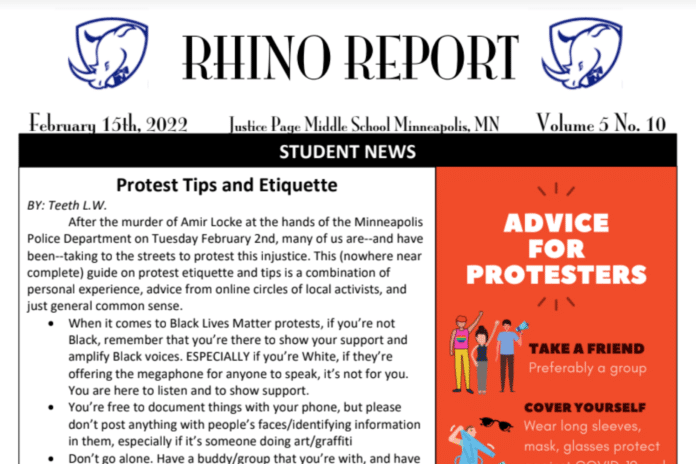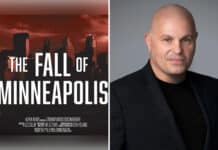A student publication associated with Minneapolis Public Schools recently gave 12- and 13-year-old middle schoolers various “tips” on effective social justice protesting.
The district’s “Community Education” division, whose mission is to “engage youth and adults in community-driven learning and enrichment opportunities,” appears to oversee the publication and distribution of “The Rhino Report” to Justice Page Middle School students. The entire first page of its Feb. 15 edition is devoted to “protest tips and etiquette.”
A concerned parent with a child enrolled at the middle school sent an electronic copy of the publication to Crime Watch Minneapolis, who said “she’s concerned about the messaging to this grade level and the fact that it wasn’t sent to parents.”
One follower of Crime Watch Minneapolis also pointed out that the word “toolkit” in “Protest Toolkit 101” is used by “higher level protest organizations,” which raises the question of who is “influencing this kind of messaging.”
The beginning of the entry reads: “After the murder of Amir Locke at the hands of the Minneapolis Police Department on Tuesday February 2nd, many of us are — and have been — taking to the streets to protest this injustice. This (nowhere near complete) guide on protest etiquette and tips is a combination of personal experience, advice from online circles of local activists, and just general common sense.”
What follows is a bullet point list of protest tips, along with general advice on the right-hand side of the page.
The first tip reminds white protesters that at Black Lives Matter demonstrations, they are there to “show [their] support and amplify Black voices,” not speak or lead the way.
“ESPECIALLY if you’re White, if they’re offering the megaphone for anyone to speak, it’s not for you. You are here to listen and to show support,” it adds.
Other tips and etiquette include having a plan of what to do if you’re separated from your group, not posting pictures of people doing “art/graffiti,” wearing “nondescript clothing,” and bringing snacks, water, a first aid kit, ibuprofen, and masks (to “protect against COVID-19 and tear gas”).
There are also tips on what to do if you’re arrested.
“In case you get arrested, write the contact numbers of both your parents/guardians and local legal aid organizations on your arm in Sharpie (put hairspray over it so it lasts longer),” the entry reads.
“If you get arrested: Invoke your right to remain silent, ask for a lawyer, don’t consent to police searching your phone, don’t consent to a DNA sample (they might say it’s standard procedure, it’s not), insist that they give you a mask, if you’re held for more than 48 hours, it’s most likely an illegal detention, which is a violation of your Fourth Amendment Rights.”
In a comment to Crime Watch Minneapolis, the Minneapolis Public Schools’ social media manager claimed The Rhino Report is written by students taking part in an “afterschool Community Education program” and it is “not an MPS publication.”
Nevertheless, the Community Education division is part of the school district’s operations, and it remains unclear how 12- and 13-year-old children would demonstrate intricate knowledge of protest etiquette without the guidance or input of adults.
The Rhino Report is published on the Justice Page Middle School’s website, where it is described as a “Minneapolis Public Schools Community Education publication.”

















